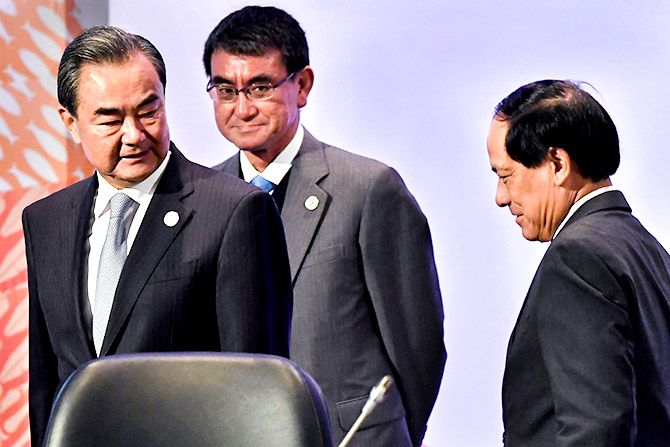'It is an unpleasant fact of history that stronger nations dominate the power play and the only way it can be mitigated is through recourse to diplomacy,' says Ambassador M K Bhadrakumar.

- Recommended for you: India's Chinese Challenge
The regional setting in which the India-China standoff at Doklam is playing out can only be ignored at our risk.
Most Indian pundits are training their guns on China's 'bullying -- its growing capacity to dominate the discourse regionally or bilaterally.
This sort of whining is futile since it is an unpleasant fact of history that stronger nations dominate the power play and the only way it can be mitigated is through recourse to diplomacy.
In the near term, the regional setting is decisively working to China's advantage.
This can be understood from three templates of regional politics that are currently playing out.
First and foremost, the 50th anniversary meeting of ASEAN foreign ministers, which concluded on the weekend in Manila, merits a close look. (Unfortunately, India lowered its representation to Minister of State for External Affairs Vijay Kumar Singh.)
The leitmotif in Manila was, undoubtedly, that China has emerged as the new regional leader, replacing the United States.
This has been in the making and is attributable to several factors, but what significantly hastened the transition is the US' difficulty to shape the region's agenda anymore.
The ASEAN countries no longer have confidence in American leadership and commitment in Asia.
In a revealing display of US priorities, US Secretary of State Rex Tillerson didn't even bother to shape the ASEAN stance on South China Sea disputes but instead focused on rallying support on the North Korea problem.
In contrast, Chinese Foreign Minister Wang Yi was all over the place with diplomatic finesse to ensure that the grouping avoided any criticism of China.
From the joint communiqué issued by the ASEAN ministers, it becomes apparent that the grouping downplayed the areas of disagreements with China.
Vietnam reportedly tried to up the ante, but Cambodia blocked the move, and host country, the Philippines, smoothly glided into its newfound role as ASEAN's moderator vis-à-vis China, counselling compromise.
Thus, the communiqué blandly 'took note of the concerns expressed by some ministers' on ongoing reclamation activities in the area 'which have eroded trust and confidence, increased tensions and may undermine peace, security and stability in the region'.
Again, the communiqué underlined the 'importance of non-militarisation and self-restraint' in the disputed areas, but it also called upon 'all other States' -- not only claimants -- to do so, implicitly voicing criticism of external powers (the US, Japan, Australia, India, etc) from ramping up their naval footprint in the area.
Of course, a net gain for Beijing has been the complete absence of any reference to the Philippines' landmark arbitration award against China at The Hague.
Tillerson met with Wang in Manila. But their discussion narrowed down to the cooperation over the North Korea problem and the preparations for President Donald Trump's forthcoming State visit to China (expected in November).
Clearly, both sides will ensure that there are some historic 'takeaways' from Trump's China visit.
Trump desperately needs something big to flaunt as his trophy for 'America First -- and, make no mistake, Beijing will leverage Trump's dire necessity to stabilise the China-US relationship and make it predictable. (Tillerson spoke about a 50-year prospective planning for the Sino-American partnership.)
Meanwhile, with the military option against North Korea virtually ruled out, the Trump administration's dependence on China's cooperation to navigate the extremely perilous waters ahead is only increasing.
The Xinhua news agency highlighted on Wednesday, August 9, Tillerson's calm estimation, advising the American people to 'sleep well at night.'
Over and above, what also needs to be factored in is that US-Russia relations will continue to remain tense for a long time to come, which would in turn give added impetus to Moscow's strategic coordination with Beijing.
The fact of the matter is that unwittingly, Trump is compelled to pursue a tougher policy toward Russia than he'd have preferred -- paradoxically, an even tougher policy than Barack Obama's (from Moscow's perspective).
If Obama opted for 'selective engagement' with Russia, Trump is under compulsion from the US Congress to pare it down to 'very selective engagement'.
All in all, therefore, China finds itself in a comfortable position in regional politics.
Most certainly, this power dynamic may run as the near term scenario even as the North Korea problem and Russian-American tensions keep turning and turning in a widening gyre and there are no easy solutions in sight.
IMAGE: China's Foreign Minister Wang Yi, left, with Japan's Foreign Minister Taro Kono and ASEAN Secretary General Le Luong Minh before the 18th ASEAN Plus Three Foreign Ministers Meeting, part of the 50th Association of ASEAN Regional Forum meeting in Manila, Philippines, August 7, 2017. Photograph: Mohd Rasfan/Pool/Reuters










